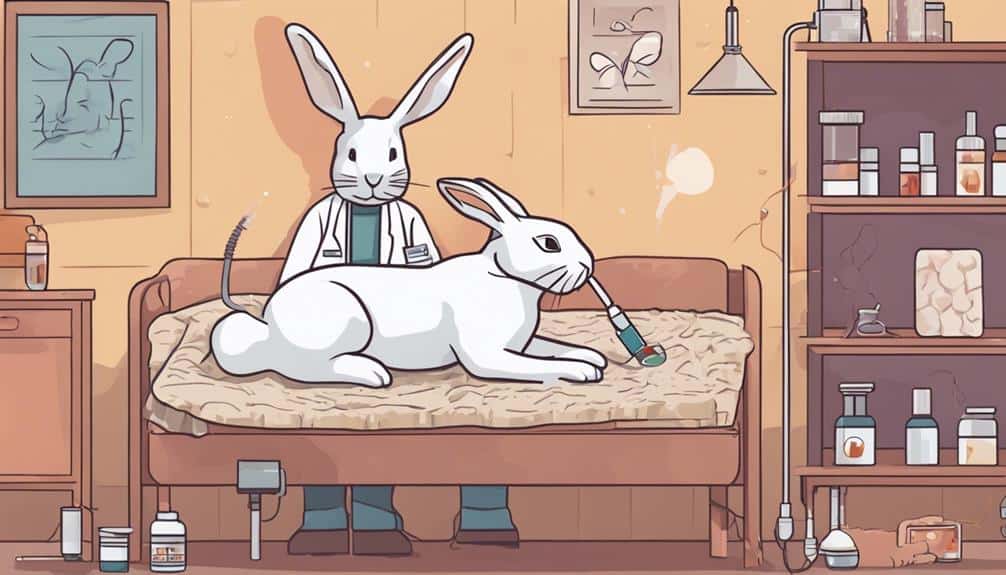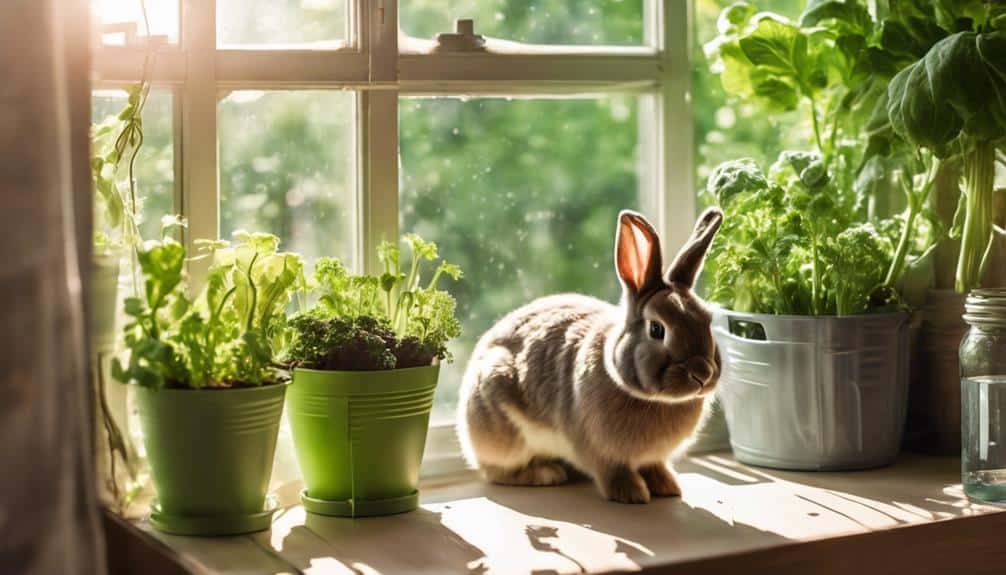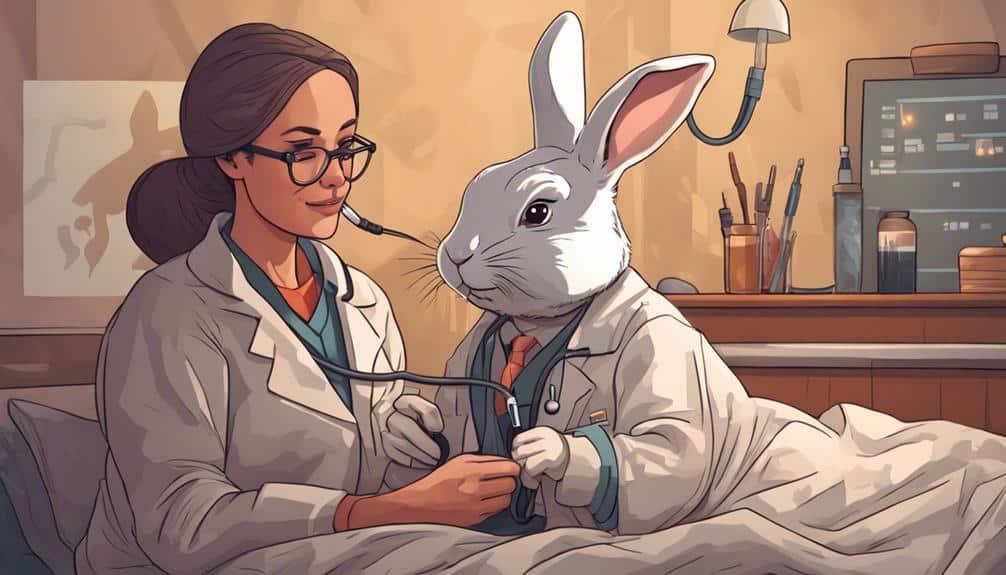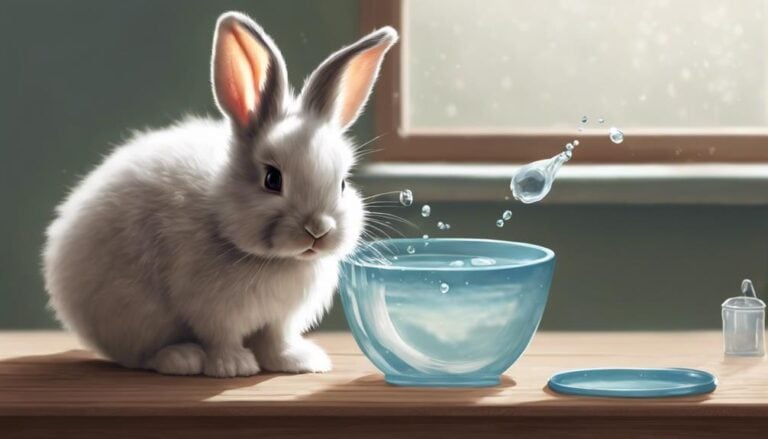Just like a delicate dance between nature and vulnerability, bunnies are not immune to the grasp of pneumonia.
But, did you know that the susceptibility of these furry creatures to respiratory troubles goes beyond what meets the eye?
Understanding the intricacies of how pneumonia affects rabbits can shed light on the importance of early detection and intervention.
So, let's explore the nuances of this respiratory ailment in bunnies and uncover the essential steps to safeguard their well-being.
Contents
- 1 Key Takeaways
- 2 Understanding Pneumonia in Rabbits
- 3 Symptoms and Diagnosis of Pneumonia
- 4 Treatment Options for Rabbit Pneumonia
- 5 Prevention of Pneumonia in Bunnies
- 6 Managing Pneumonia in Rabbits
- 7 Prognosis and Recovery From Rabbit Pneumonia
- 8 Frequently Asked Questions
- 9 Can Snoring in Bunnies Lead to Pneumonia?
- 10 Conclusion
Key Takeaways
- Pneumonia in rabbits is common due to various infections causing lung inflammation.
- Symptoms like anorexia, lethargy, and respiratory distress indicate rabbit pneumonia.
- Timely diagnosis through chest X-rays and tests is crucial for effective treatment.
- Antibiotics, supportive care, and prevention strategies are vital in managing rabbit pneumonia.
Understanding Pneumonia in Rabbits

Pneumonia in rabbits is a serious respiratory disease that can stem from bacterial, viral, fungal, or parasitic infections, triggering significant lung inflammation. This condition poses a threat to your rabbit's health and requires prompt attention. Symptoms of pneumonia in rabbits may manifest as anorexia, weight loss, lethargy, fever, respiratory distress, and nasal or eye discharge.
To accurately diagnose pneumonia in rabbits, veterinary professionals utilize tests such as chest X-rays, blood serum analysis, and identification of the specific infectious agent for targeted treatment.
Treatment for pneumonia in rabbits typically involves a combination of antibiotics, fluid therapy, oxygen support, and general care to aid in your rabbit's recovery process. Prevention strategies for pneumonia in rabbits include maintaining good hygiene practices, ensuring proper ventilation in their living environment, minimizing stress factors, and seeking immediate veterinary care if any respiratory symptoms arise.
Symptoms and Diagnosis of Pneumonia
When observing bunnies for signs of pneumonia, be vigilant for symptoms such as anorexia, weight loss, lethargy, fever, sneezing, excessive salivation, and nasal or eye discharge. These signs can indicate respiratory distress and the presence of lung inflammation caused by infections.
To diagnose pneumonia in bunnies, veterinarians assess clinical signs, conduct chest x-rays, analyze urine and blood serum, and examine cellular discharge for infectious organisms.
Here are three key points to remember about symptoms and diagnosis of pneumonia in bunnies:
- Early detection of symptoms such as anorexia, lethargy, and nasal discharge is important for prompt veterinary care and accurate diagnosis.
- Chest x-rays play a crucial role in identifying lung abnormalities and confirming the presence of pneumonia in bunnies.
- Understanding the type of infectious organism causing pneumonia is essential for determining the appropriate treatment plan for bunnies.
Timely recognition of symptoms and proper diagnosis are fundamental in providing effective treatment and management for bunnies suffering from pneumonia.
Treatment Options for Rabbit Pneumonia

When treating rabbit pneumonia, it's important to administer antibiotics like enrofloxacin, sulfonamides, tetracyclines, ceftazidime, or amikacin.
Providing supportive care through intensive nursing, nutrition support, probiotics, nebulization, and oxygen therapy is vital for the rabbit's recovery.
Monitoring respiratory symptoms and the rabbit's overall condition using radiographs, ultrasonograms, endoscopic evaluations, and white blood cell counts helps determine the effectiveness of the treatment.
Antibiotics for Rabbits
Wondering which antibiotics are effective for treating rabbit pneumonia? Here's what you need to know:
- Enrofloxacin, trimethoprim sulfa, chloramphenicol, penicillin G, and azithromycin are known to be effective against bacterial pneumonia in rabbits.
- Treatment of rabbit pneumonia with antibiotics should be based on culture and sensitivity testing to guarantee proper effectiveness.
- Proper antibiotic selection and administration are critical for successfully managing rabbit pneumonia by targeting the specific bacteria causing the infection.
Supportive Care Measures
To effectively manage rabbit pneumonia, implementing supportive care measures is pivotal in maintaining the rabbit's health and aiding in recovery. Supportive care includes fluid therapy to support immune function, oxygen therapy for respiratory distress, and nutritional support to sustain energy levels. Nebulization therapy can assist in clearing respiratory secretions and improving lung function. Close monitoring of the rabbit's progress and well-being is essential for effective care. The table below provides a visual representation of these supportive care measures:
| Supportive Care Measures | Description | Benefits |
|---|---|---|
| Fluid Therapy | Maintains hydration | Supports immune function |
| Oxygen Therapy | Manages respiratory distress | Ensures adequate oxygen levels |
| Nutritional Support | Helps maintain energy levels | Aids in recovery |
| Nebulization Therapy | Clears respiratory secretions | Improves lung function |
| Close Monitoring | Tracks progress and well-being | Ensures effective care |
Monitoring Respiratory Symptoms
Monitoring respiratory symptoms in rabbits with pneumonia requires keen observation for indicators such as increased respiratory rate, wheezing, nasal discharge, and labored breathing. To guarantee effective management, consider the following:
- Regular Check-ups: Schedule frequent veterinary visits to monitor the rabbit's progress and adjust treatment as needed.
- Temperature Monitoring: Keep track of the rabbit's body temperature as fever can indicate worsening infection.
- Behavioral Changes: Watch for changes in appetite, activity levels, and overall demeanor, as these can signal complications or treatment efficacy.
Prevention of Pneumonia in Bunnies

To prevent pneumonia in bunnies, maintaining a clean and hygienic living environment is essential. Poor nutrition and improper ventilation can weaken a bunny's immune system, making them more susceptible to respiratory infections. Make sure the hutch has proper ventilation to reduce the risk of pneumonia.
Regularly clean the living space, including bedding and litter boxes, to minimize respiratory health risks for your bunnies. Providing a vital stress-free environment is critical, as stress can also compromise their respiratory health.
If you notice any signs of respiratory infections such as sneezing or nasal discharge, promptly seek veterinary care. Timely treatment of respiratory issues can prevent them from escalating into pneumonia. By focusing on hygiene, proper ventilation, a clean living environment, and prompt treatment of any respiratory concerns, you can significantly reduce the likelihood of pneumonia in your beloved bunnies.
Managing Pneumonia in Rabbits
When managing pneumonia in rabbits, immediate veterinary attention is essential to guarantee proper treatment and care for your furry companion. Here are three key steps to help you manage pneumonia in rabbits effectively:
- Veterinary Intervention: Seek immediate veterinary attention if you suspect your rabbit has pneumonia. The vet will diagnose the condition, often through physical examination and possibly x-rays, and prescribe appropriate antibiotics to combat bacterial pathogens causing the respiratory disease.
- Supportive Care: Treatment may involve fluid therapy to make sure hydration and oxygen support to assist congested lungs. Encourage your rabbit to eat by offering moistened greens and feeding gruel as directed by the vet. Rest and limited activity will aid in the recovery process.
- Monitoring and Compliance: Follow your vet's recommendations diligently. Monitor your rabbit closely for signs of improvement, such as increased activity and appetite. Adhere to prescribed diets and care routines to guarantee a smooth recovery process.
Prognosis and Recovery From Rabbit Pneumonia

Recovering from rabbit pneumonia can be a challenging process that requires intensive care and close monitoring to assess prognosis and guide recovery efforts.
The prognosis for rabbits afflicted with pneumonia hinges on the severity of the infection and the timeliness of treatment initiation. Intensive care, including the administration of antibiotics, fluid therapy, and supportive treatments, is often necessary.
Pneumonia in rabbits can give rise to complications such as abscesses, lung collapse, and respiratory distress, complicating the recovery process. Careful observation of the rabbit's symptoms, response to treatment, and general condition is vital for evaluating prognosis and directing recovery endeavors.
With prompt veterinary intervention and proper management, rabbits with pneumonia can recuperate and resume their regular activities, although some instances may demand long-term care. Underlying factors like poor nutrition and exposure to bacterial pathogens can influence the recovery trajectory, emphasizing the importance of diligent care and monitoring during the recuperative phase.
Frequently Asked Questions
Can Rabbits Catch Pneumonia?
Yes, rabbits can catch pneumonia. Their health is affected by common illnesses like respiratory issues. Symptoms include runny nose, sneezing, and lethargy. Good bunny care involves preventing infections through hygiene, prompt veterinary care, and maintaining respiratory health.
Can Humans Pass Illness to Rabbits?
You can pass illnesses to rabbits through close contact. Their sensitive respiratory systems make them vulnerable. Prevent transmission by washing hands, avoiding contact when sick, and keeping a distance. Protect your bunnies by taking precautions and seeking veterinary care when needed.
Is Pneumonia Contagious to Animals?
Pneumonia can be contagious to animals, spreading through respiratory symptoms like coughing and sneezing. Animal transmission of zoonotic infections requires veterinary care, quarantine, and prevention measures to protect pet health and manage transmission risks effectively.
Can Rabbits Survive Respiratory Infection?
You can help your rabbit survive respiratory infections with prompt veterinary care, antibiotics, and supportive treatment. Monitor symptoms closely, provide fluid therapy, and maintain good hygiene to aid recovery. Prevent reinfection and confirm proper ventilation for improved air quality.
Can Snoring in Bunnies Lead to Pneumonia?
Yes, bunnies can indeed snore. However, it is not common and could be a sign of an underlying health issue. According to recent bunnies snore article information, persistent snoring in bunnies could potentially lead to pneumonia if left untreated. It is important to monitor their respiratory health and seek veterinary care if necessary.
Conclusion
So, next time you notice your bunny showing signs of illness, remember that they can indeed catch pneumonia. Just like us, they need prompt medical attention and proper care to recover.
Think of your rabbit's lungs as delicate flowers in need of gentle care and protection.
By staying vigilant, seeking veterinary help early, and following treatment recommendations, you can help your furry friend bounce back to health and continue hopping around happily.






